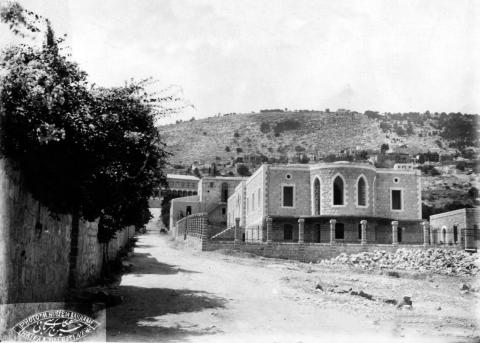This is a remarkable description of Mr. Furutan's last minutes of his mortal life. It is truly amazing . . .
I would like to share with you the most memorable and distinctive moment of my pilgrimage, which became a spiritual lesson and a lodestar, which enlightened the rest of my life. It happened 26th of November, on the Day of Covenant . . . In the evening at the Pilgrims Reception Center we were supposed to meet with the Hand of the Cause of God - Mr. Furutan. The meeting was appointed for 6 p.m. It wasn't our first meeting with him. First time I saw him on the first day of pilgrimage - 24th of November. He gave a marvelous speech and promised us to come every other day. He said that before he used to come every day to meet with pilgrims, as Shoghi Effendi mentioned, that pilgrims were the guests of Bahá’u’lláh. But now doctors recommended him to come once in two days because of the age. He asked us to come on Wednesday with children, as he was going to speak about teaching the Faith. Now you can imagine our disappointment, when we were told, that Mr. Furutan wouldn't come. Then I remembered that when he first came to meet with pilgrims, he looked very weak and fragile. It seemed to me that his energy was slowly disappearing. Of course, the first thing I thought was that he was not able to come because of the state of health.
Many pilgrims decided to go to their hotels, but some of us, among whom were Nabil and me, decided to stay, hoping that the meeting will still take place. How happy I was when ten minutes to six we were told that Mr. Furutan would come. As soon as this unique person entered the room, it became clear what efforts it took him to come here. He looked very pale and even transparent. It seemed that he no longer belonged to this world. However, notwithstanding this weakness, he went up the stage and put the
microphone.
Mr. Furutan's speech was dedicated to the Duty of teaching the Faith. First he read the quotation of Bahá’u’lláh from the "Gleanings":
"Say: Teach ye the Cause of God, O people of Bahá, for God hath prescribed unto every one the duty of proclaiming His Message, and regardeth it as the most meritorious of all deeds. Such a deed is acceptable only when he that teacheth the Cause is already a firm believer in God, the Supreme Protector, the Gracious, the Almighty. He hath, moreover, ordained that His Cause be taught through the power of men's utterance, and not through resort to violence. Thus hath His ordinance been sent down from the Kingdom of Him Who is the Most Exalted, the All-Wise." (Bahá’u’lláh, Gleanings from the Writings of Bahá’u’lláh, p. 278)
Then the Hand of the Cause shared with us his understanding of the word duty. As an example, he told us a story. It happened in Russia, when Nikolai the II was the tsar. One day Nikolai the II was walking in the courtyard of his palace. He noticed the guard, who looked very ill, his face was red and swollen. He approached him and asked what illness he had. The guard answered that he had malaria. Then the tsar told him that he needed special care and that he could go home. But the guard replied that he was not able to leave his post without the senior officer's permission and that it was his duty to guard the palace till the last breath. Then Nikolai the II took his gun and told him, that in such case, he would replace him at his post till the senior officer came and he would inform him that he personally let the guard go and that he fulfilled his duty. "This is what duty means" - Mr.Furutan said. "The reason I came here today is because it was my duty to come. And if it is a duty - you have to fulfill it."
Many people know that Mr. Furutan lived and studied in Russia and that he still loves to speak Russian and loves those who speak Russian. Fortunately, all the Russian-speaking friends were present at the gathering. And when he was telling the story, he often translated some words into Russian, and especially, the words "duty" and "responsibility". When the Hand of the Cause finished his speech, he immediately approached the Russian-speaking pilgrims and asked in Russian: "Friends, did you understand what I said? Did you understand what is duty and responsibility?"
These words were almost the last words in his life, as in few minutes he passed away. He died before our eyes, peacefully and with dignity, on the pilgrims' hands, whom he appreciated so much. His life and his passing away became for me an example of true servitude, steadfastness in the Covenant, and faithfulness to the Cause of God. By his own life he showed us what duty is and how we have to fulfill it till the last breath!
